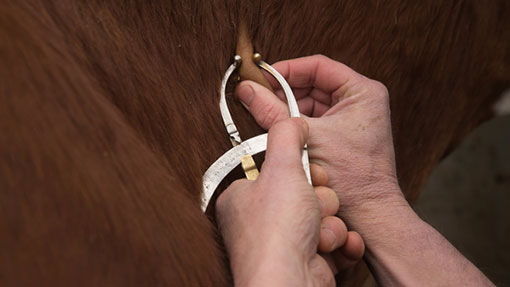Farmer slams Defra over 150-mile trip for TB cows

A Dorset farmer whose TB-infected cattle were forced to travel more than 150 miles to be slaughtered has slammed Defra secretary Owen Paterson for failing to protect his cows’ welfare.
Kevin Wallbridge, a dairy farmer from Hooke, was forced to allow 14 of his cows to travel to West Wales or risk losing up to £10,000 in compensation.
Mr Hooke, who initially refused to let officials take the cattle last week, met Mr Paterson at the Devon show to urge him to step in and allow his cattle to be slaughtered at a local abattoir.
See also: Call to stop TB sluaghter trek
But despite Mr Paterson expressing shock at the plans to take the animals on a journey which Mr Wallbridge feared could take as much as 24 hours, the cattle were collected by government contractors and taken to West Wales on Tuesday (27 May).
“I’m disappointed with Owen Paterson and I’m sure if he wanted to he could have done something,” said Mr Wallbridge.
“He said he was shocked when I told him what was happening last week, and although he didn’t have a lot of time to change things, he could have granted a reprieve.
“Clearly people at the top don’t understand what farmers are going through with continued TB testing, uncertainty and concerns about animal welfare.
“When animals go to slaughter we get no say what happens and Defra can ride roughshod over any welfare issues.”
Mr Wallbridge’s cattle were first test positive for the disease six weeks ago, but was told be the Animal Health and Veterinary Licensing Authority (AHVLA), which manages the bovine TB operation in cattle, that they would have to be slaughtered in West Wales.
“I’m disappointed with Owen Paterson and I’m sure if he wanted to he could have done something.”
Kevin Wallbridge, Dorset farmer
Unhappy with how long his cattle – some of which were pregnant – would be forced to travel in a lorry, Mr Wallbridge refused to let his cattle leave the farm and instead asked for them to be killed at his local slaughterhouse in Taunton.
But officials from the AHVLA told Mr Wallbridge that they had a contract with the abattoir in Wales which was offering to pay £200 more than his local slaughter house.
Unless he allowed the cattle to be collected on Tuesday, he would have had to arrange for slaughter himself and would not have been able to claim compensation for the infected cattle.
“I don’t think it’s right that the cattle went to Wales, but despite what my conscience says I can’t afford to lose £10,000 in compensation,” Mr Wallbridge said.
“I even offered to pay the £200 difference to take the cattle to the local abattoir, but they said I couldn’t.
“It wouldn’t have been nice to see cows that close to calving go to a local abattoir, but to know they had such a long journey ahead of them is even worse. If they go down in the lorry, what they will go through it doesn’t bear thinking about.”
Mr Wallbridge said he would continue to push the AHVLA and Defra to find out why the decision could not be reversed.
“My cattle need to be tested again in June so there’s a real chance this could happen again,” he added. “It’s a scandal, and I’m not stopping until I get answers.”
An AHVLA spokesman said not all abattoirs were contracted to take TB reactor animals, but animal welfare was a primary consideration when deciding which one they were sent to.
Animals deemed unfit would be transported would normally be slaughtered on-farm.
“To maximise best value-for-money for the taxpayer, alongside ensuring journey times to slaughter strictly adhere to welfare during transport regulations, AHVLA selects the slaughterhouse which provides the best financial return,” he added.
“Cattle owners do have the option of choosing not to receive government compensation and to arrange slaughter privately. In such cases the cost of arranging slaughter falls to the owner, but they retain any salvage value paid by the slaughterhouse.”
